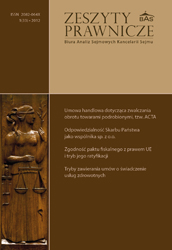Opinia na temat Traktatu o stabilności, koordynacji i zarządzaniu w Unii Gospodarczej i Walutowej, w tym jego relacji z innymi dokumentami (...)
Legal opinion on Treaty on Stability, Coordination and Governance in the Economic and Monetary Union including its relation with other documents (...)
Author(s): Artur Nowak-FarSubject(s): Law, Constitution, Jurisprudence
Published by: Kancelaria Sejmu
Keywords: Poland; the fiscal compact; European Union; budget;
Summary/Abstract: The Fiscal Treaty (FT) does not contain provisions which significantly modify (in both formal and praxiological sense of this term) fundamental arrangements pertaining to the economic governance in the European Union (and the EMU). Rather, it augments the arrangements already present in EU legal order. The most important material modifications introduced by the FT include: (a) a new formula for the equalization of public budget balances – essentially invoking the CBS (close-to balance-or suprlus) rule – but with some relaxing arrangements similar to that applied in the Six pack; (b) making the signatory parties obligated to introduce in their legal systems rules of budgetary discipline – either at the constitutional level, or at any lower level provided, however, that the legal vehicles used to achieve this are not subject to easy change; (c) setting forth an obligation of multilateral, ex ante reciprocal information-sharing with regard to any planned public debt issue. The FT, although itself not being a part of the EU legal order, invokes the that very order thus significantly undermining its intergovernmental character. The new arrangement is also relatively open to non-euro zone EU Member States. As a result, FT does not undermine or weaken the EU legal and institutional order. Instead, it provides for elasticity achievable under the circumstances where not all EU Member States supported the idea the FT realizes.
Journal: Zeszyty Prawnicze BAS
- Issue Year: 2012
- Issue No: 1
- Page Range: 102-122
- Page Count: 21
- Language: Polish

